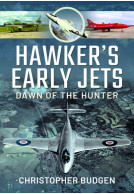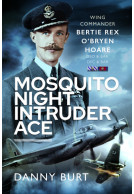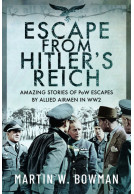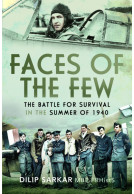Hawker's Secret Cold War Airfield (Hardback)
Dunsfold: Home of the Hunter and Harrier
Imprint: Air World
Pages: 336
Illustrations: 50 black and white illustrations illustrations
ISBN: 9781526771759
Published: 28th September 2020
(click here for international delivery rates)
Order within the next 2 hours, 47 minutes to get your order processed the next working day!
Need a currency converter? Check XE.com for live rates
| Other formats available - Buy the Hardback and get the eBook for free! | Price |
|---|---|
| Hawker's Secret Cold War Airfield eBook (27.8 MB) Add to Basket | £6.99 |
In 1948, Hawker Aircraft, faced with new jet projects that could not use their existing airfield at Langley, began the process of searching for alternative accommodation for their flight-testing requirements. It would, however, take three hard years before Dunsfold Aerodrome would be made available by a reluctant Air Ministry and the company was able to launch its first jet aircraft design – the Sea Hawk – into series production for the Royal Navy, closely followed by the superlative Hunter. Hawker Aircraft would go on to produce nearly 2,000 Hunters before other projects came to the fore.
As Hunter production continued in the late 1950s, the company looked to its successor – the Mach 2 capable air superiority fighter designated P.1121, though this would stall before flight in the wake of serious national financial short-falls. With the loss of its premier project, the company came upon a radical new engine proposal and schemed an aircraft around it capable of vertical take-off and landing. While many decried the proposal, claiming it would never amount to anything, the Harrier would go on to prove the nay-sayers wrong as it came into its own during the Falklands War.
Following the Harrier, Hawker Siddeley stepped into the competitive trainer aircraft market with the Hawk for the RAF. After completion of the RAF requirement, Hawk was sold into air arms across the world, including the US Navy, an incredible achievement for a UK design. British Aerospace then brought forth the Harrier GR.5, the UK version of the US AV-8B, a completely upgraded and improved Harrier.
One might expect that this prolific output was the result of some massive industrial plant in the Midlands rather than an isolated aerodrome tucked in the rural hinterland of south Surrey. Surrounded for most of its existence by secrecy, due to the nature of its work, Dunsfold has largely escaped the notice of the general public. This work shines a light on the remarkable work carried out there.
Review by Chris Farara
The Aviation Historian
There are numerous illuminating and previously unpublished anecdotes which will enlighten and entertain the reader. The book is not only of interest to those who worked at Dunsfold, but also to all who value Britain’s contribution to the world of military aviation. This comprehensively illustrated book is clearly the result of much original research and so is a valuable contribution to the database of recorded aeronautical history.
"Christopher Budgen provides us with an interesting and readable account of what happened ‘behind the wire’ at Dunsfold. As such, it provides us with a considerable insight into a world that few of us were ever privileged to witness."
Royal Aeronautical Society - September 2021
Read the review here
As seen in Panorama Difesa and JP4
Panorama Difesa and JP4
The text give equal weight to the airfield itself, to the personalities involved and to the aircraft produced by Hawker and it's successor companies and flown from there.
Aeroplane
This is a gripping tale, ably constructed by an author with access to first-hand research material, eminently able and anxious to chronicle the true facts before they decayed through indifference and neglect.
The de Havilland Moth Club Ltd
Highly recommended.
Website of the Royal Aeronautical Society
Review by Marco De Montis
Panorama Difesa, February 2021
The title of this volume is already explanatory and defines its originality. Rarely does a book describe in such detail the long history of a military airport home to a builder, moreover, masterfully intersecting it with the rapid and enthralling evolution of corporate events, in an era as tumultuous as the second postwar period. The author is among the most qualified for this exciting story, having worked in the Hawker development department.
Review by Richard K. Parkhurst
The International Plastic Modellers Society Portsmouth
The author worked at this previously closed and secretive site for 21 years and has written a highly informative account of the work that has taken place there.
Highly recommended.
The opportunity to read more about anything to do with Hawker Siddeley is most welcome.
Books Monthly
A really interesting read for any aviation historian.
Military Model Scene, Robin Buckland
Read the full review here
As featured on Scale Modelling Now
Scale Modelling Now
About Christopher Budgen
CHRISTOPHER BUDGEN, growing up in the shadow of Hawker’s Flight Test Centre at Dunsfold in Surrey, entered employment there in the 1970s, shortly after the nationalisation of the aircraft industry and the company’s amalgamation into state-owned British Aerospace. During 21 years with BAe, as well as working on many Hawk, Harrier and Sea Harrier projects, he was also fortunate to be involved with Hawker’s superlative Hunter in the guise of a modified T.8M used in the development of the Sea Harrier for aircrew training. Chris’s previous book detailing Hawker history – Hawker’s Secret Cold War Airfield – is now followed by this work. As an archivist for some years engaged at Brooklands Museum and specializing in Hawker Aircraft Ltd and successor companies, Chris is well-placed to bring to light the previously unrecorded detail of Hawker’s fascinating history.

















